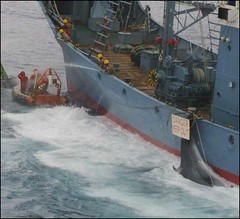IF the idiots from Greenpeace stopped using whaling as a major fundraising vehicle there is a very good chance the Japanese would stop harpooning the dumb beasts.
Though there are a few whale restaurants still operating and some of the old folk living in coastal villages which traditionally tucked into whale as a handy source of protein may hanker for a lump of leviathan, few of the younger generation would cross the road for a whale burger if there was a choice of a McDonald's patty.
Even among those middle-aged folk fed whale meat at their schools in the lean post-war years, few harbour deep longing for a whale steak if a slice of Aussie beef is available.
Not surprisingly, the Japanese do not want to be told what to do by people like those involved with an organisation like Greenpeace, an untaxed multinational with a proven track record of telling fibs when it suits its purposes, shown when one-time Victorian premier Joan Kirner fell for its line that Nufarm was pumping poison out of its Werribee plant and shut the operation down at a cost of millions and hundreds of jobs.

1 comment:
In Japan, whales are counted as fish and come under the Fisheries Ministry, but those bureaucrats are out of step with most other government departments when it comes to whaling, not the least of those being the Ministry of Foreign Affairs.
While whaling might make the front page in Australia, it is pretty ho-hum here.
A student at Keio University in Tokyo asked me: "Why are Western people so interested?"
He went on to say while he did not fancy whale himself, he had never seen any scientific evidence to suggest the variety of whales taken by the Japanese were declining because the annual catch, but he had heard a lot of emotional arguments.
Like the arguments regularly made against culling kangaroos by people who do not have any facts but think it is wrong for a nation to hunt and eat the animal which appears on the nation's coat of arms.
He was prepared to see Japan stop whaling if anyone presented evidence minke whales were on the way out.
It is difficult to argue against that logic, particularly as Australian Aborigines are given permission to hunt creatures like turtle and dugong which some people consider are under severe pressure, and there is no question Japanese were eating whale meat centuries before Europeans reached the antipodes.
Nor can it be argued Australian Aborigines should be permitted to hunt dugong and so forth because they use traditional methods. The rifle was not around in the dreamtime and there is no legend pertaining to the 90hp outboard either.
They are as traditional as a Japanese whaling ship with a grenade-tipped harpoon.
The knuckle-headed eco-freaks would be better served if they pulled back a little and thought things through more clearly instead of claiming every whale, given the chance, would be a Nobel-prize winning poet.
On second thoughts, Maya Angelou's works do sound not dissimilar to some of the moaning mammals Judy Collins liked to sing along with.
As it happens, Australians can actually take a lot of the credit for introducing the Japanese to modern ocean-going whaling 175 years ago.
That was when Captain Bourn Russell sailed the Australian whaling ship Lady Rowena into Hamanaka Bay on the island of Hokkaido for repairs and stores before resuming the hunt.
Professor Neville Meaney details the 1831 episode in his book titled Towards a New Vision: Australian and Japan Through 100 Years, and notes while Captain Russell met some resistance, stormed ashore, sacked a temple and then kidnapped a local in a curious attempt to break the ice, the Tokugawa Shogunate did change its closed door "sakoku" policy and permit foreign ships to resupply from 1842, a clear 14 years before America's Commodore Perry forced a full scale opening.
Whaling caused Captain Russell some grief but the biggest problem today is the anti-whaling crowd in Australia and the meagre pro-whaling crew in Japan are talking past each other - not to each other - and the longer this situation goes on the hotter tempers will get.
Plenty of Japanese admit they are not particularly impressed by Korean neighbours who like to sit down to a dog dinner. As do some Chinese and Vietnamese.
The British are not so partial to horse, but mention cheval to some of their French friends, and they'll tell you what wine would go best with Phar Lap.
From some statements made by Federal Environment Minister Ian Campbell about wind farms and the orange bellied parrot, not to mention his outbursts at the International Whaling Commission conference in the Caribbean, it would appear he has been captured by the Greens and is more a part of the problem than the solution.
The heat must be taken out of this issue and it will not happen while Greenpeace is staging stunts in the Antarctic.
We do not talk of boycotting Norway but the Norwegians run a commercial whale fishery.
The environment movement is either happy to pander to the racists by targeting the Japanese or it knows its anti-whaling posture is its greatest fundraiser.
There is no doubt most Japanese would be happy to save whales (without thinking of collecting valuable prizes) but they need someone other than the usual suspect organisations to convince them why they should.
Piers Akerman is taking part in an Australia-Japan Exchange as a guest of the Japanese Ministry of Foreign Affairs.
Post a Comment